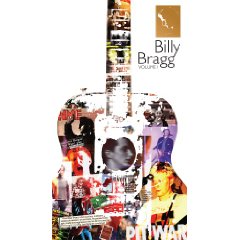I mean, really. Does the world need a re-release of a boxset that follows ten solo albums, two collaborations with Wilco and a quite staggering seven separate compilations? And it’s not even a complete retread of Stephen William Bragg’s career, because there’s a whole second set that covers the later years. Moreover – oh dear winds of capitalism, please blow harder! – there’s no difference between this re-release and the original, which only emerged three and a half short years ago. Is this really necessary?
The short answer is a vast, echoing YES. The long answer is the rest of this review.
Roughly covering the first decade of Bragg’s solo career, from the early days after he bought himself out of the army and started traipsing the length and breadth of the country with only a guitar through chart success via Kirsty MacColl borrowing ‘A New England’ to visits to the political short-fuses that were Nicaragua, East Berlin and the Soviet Union, this boxset demonstrates two things. Firstly, just how prolific and unbelievably consistent he was back then and, furthermore, how there simply hasn’t been an artist quite so astute at documenting what growing up is like (with all its wet, nauseating terrors; moving from internal fears to an external realisation of the fuckedness of 80s England, and balancing the physical maturation no one ever asks for with the sorry, lonely worry that the opposite sex will always, always be a mystery) since his glory days.
‘The Man In The Iron Mask’ and ‘The Saturday Boy’ are two fine depictions of emotional submission that never quite lose sight of what it feels like to see a pretty person and know they’ll never want to wake up next to them, while ‘A Lover Sings’ and ‘To Have And To Have Not’ accurately convey the bliss that comes with wanting to how you care about someone. Taking the mundane and transforming it into the mythic is one of his best skills, as with ‘A13, Trunk Road To The Sea’, which romanticises a long strip of tarmac that to many is just a grey ribbon, but to the young Bragg growing up in East London represented escape. And considering the likes of ‘Richard’, ‘Strange Things Happen’ and ‘The Busy Girl Buys Beauty’ were all present on his first two releases, the raw wordsmithery of the then-young Clash fan becomes quite staggering. It’s eminently believable to imagine that every single song from Life’s A Riot With Spy Vs Spy and Brewing Up With Billy Bragg has, at least once, been used by one soul to tell another they love them.
And by Talking With The Taxman About Poetry Bragg had managed to move away from the simple-but-affecting over-personalised vignettes to really shine as both a storyteller and rabble-rouser. ‘Levi Stubbs’ Tears’ is still as much of an emotional gut-punch as it ever was, and ‘There Is Power In A Union’ could stir even the most lapsed pinko into action. Granted, ‘The Internationale’, a purposely-political EP can feel somewhat laboured at times, but ‘My Youngest Son Came Home Today’ and ‘I Dreamed I Saw Phil Ochs Last Night’ are still quietly shocking in the most gentle way.
The extra discs that accompany each album have more than enough on them to make them relevant to more than the fiercest obsessive. The DVDs of old live shows in the aforementioned far-flung locales are eye-opening by their very existence – he took his guitar and just played for the people he wanted to play for – and the 1985 edition of The South Bank Show is further proof his work has merited serious discussion for almost 25 years. While the flood of alternate and instrumental versions of various songs are generally skippable, the likes of ‘Only Bad Signs’, ‘Back To The Old House’, ‘Speedway Hero’ and the aforementioned ‘A13…’ show that to dismiss or embrace him on the strength of the big favourites doesn’t tell the full story. There’s the argument that if you’ve got ‘A New England’ and ‘…Milkman…’ in your canon then any other songs written are sadly superfluous; not so, because what this boxset does is reveal that Bragg can make a fucking road seem magical.
In that respect he’s our Springsteen – a comparison that bears further fruit when tracing the way he melds the personal and political in ‘St Swithin’s Day’ and ‘Help Save The Youth Of America’. Bruce sang the souls of the young and lost in New Jersey, and Bragg does the same: it was simply impossible to be politically apathetic in 1984. While surrounded by peers either stuck in dead-end jobs or getting ritually fucked by Thatcherism but who still got in a mess about girls, it’s his graceful lyrical touch that gives practically everything its continued relevance.
So why, then, if it’s been established over and over that he’s a national treasure blah blah blah, does anyone still need to fucking listen to his music, let alone drop a bunch of cash on a boxset like this? Because if we don’t take the time to remind ourselves that it’s OK to feel like you can’t go and talk to someone you fancy and end up going home and sitting in the bath for an hour, it’s OK to want to change the world but not know how to, it’s fucking OK to be awkward and unattractive and have a big nose and, more than anything, it’s OK to believe in your fellow man. It might be a shame that all this stuff needs reiterating, but that’s the way it is. Billy Bragg changed my life. And he could change yours.


